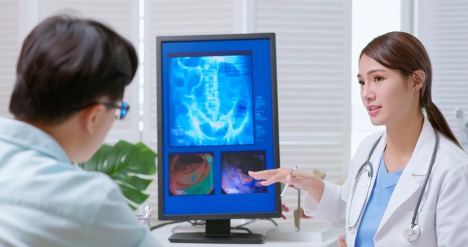Albany Gastroenterology Consultants Has Joined Allied Digestive Health, a Leading Gastroenterology Provider Network

Attacks of colon pain can come out of seemingly nowhere, and these attacks can be extremely painful and long-lasting. Those who experience colon pain should take it very seriously and should receive medical treatment as soon as possible. Several inflammatory bowel diseases can cause you to experience colon pain, and it is even possible that you are experiencing early signs of colon cancer. You do not want to ignore this pain or pretend that it is not happening. It is best to try to react and respond to it as soon as you realize that something must be done. You need to know what to do if you experience colon pain.
In this article, we will discover what to do if you experience colon pain. Read on.
It is impossible to pinpoint the causes of an individual’s colon pain until they receive medical tests that can officially clarify why they are going through the pain they are going through. That said, it is ideal to know about a few of the potential causes of colon pain so you at least have some kind of starting point to go off of. A few potential causes include:
Some of these potential causes are relatively minor and can be easily treated with over-the-counter (OTC) medications. However, some of these issues are far more serious (such as colorectal cancer) and will require more extensive treatment. This is why there is no excuse for delaying getting to a doctor to verify what is causing your colon pain.
There is a medical examination process that one will go through when they are seeking to have their colon pain diagnosed. VeryWell Health explains what this might look like:
There are so many reasons for pain in the abdomen or the colon, so various tests might be required. The list might be narrowed down by the presence of other symptoms, such as diarrhea, constipation, blood or mucus in the stool, or other things going on outside of the digestive system.
A few of the potential tests that your doctor might order include the following:
Typically, your doctor will begin with a physical examination of your body. This is non-invasive and simply allows the doctor to get an initial assessment of where things might stand with you. Your doctor is likely to listen to your abdomen with a stethoscope and feel it to see if they can detect any masses or tender spots. Your doctor might also require you to submit to a rectal exam. This is when they briefly insert a gloved finger into your rectum to check for masses, blood, or other troubling signs of potential disease.
Many doctors decide to start with the least invasive tests with their patients first to try to keep things as comfortable as possible for those patients. As such, they may order an abdominal ultrasound to get a better look at your internal organs. You don’t have to fret about radiation with a test like this as it is not part of this exam. Instead, it can easily be done at the doctor’s office or as an outpatient procedure.
This is a type of X-ray that can help doctors by producing a series of images that they can use to produce images of the abdomen. A professionally trained radiologist can then review those images to see if they spot any kind of abnormalities or other issues that must be addressed as soon as possible. That is extremely helpful when attempting to diagnose a patient with a particular issue.
It is recommended that men get a colonoscopy every 7-10 years after they reach age 45 assuming they have no family history of colon cancer. This is a routine medical procedure that can save your life by allowing a doctor to get an early indication of a potential problem with your colon. If you come to a doctor’s office complaining of colon pain, they will likely recommend a colonoscopy to help determine why you might be in pain and what treatment options to move forward with.
Your doctor needs to get a good look at your white and red blood cell count to see if there is anything unusual going on there as well. Yet again, this is a tell-tell sign that can tip off your doctor to a large problem going on within your system. If that is the case, early detection is the key to turning things around. Lab tests are an essential part of diagnosing what is happening to your body.
The treatment options offered to you will heavily depend on the determined cause of your colon pain. The severity of what you are experiencing is another factor that doctors must give fair consideration to as well. A few examples of what to do if you experience colon pain and several potential treatment options include:
Ask your doctor about which treatment options are likely to be best for you, and take heed of what they have to say. After all, you certainly want to ensure that you are putting yourself on the right path to take care of your underlying colon pain.
For Your Visit
Albany
P: (518) 533-5000
F: (833) 438-1946
1375 Washington Ave, Suite 101
Albany NY, 12206
Office & Lab: Suite 101
Endoscopy Center: Suite 201
Infusion Center: Suite 101
Mon – Thurs: 7:30 AM – 5:00 PM
Fri: 7:30 AM – 4:00 PM
Sat & Sun: Closed
Clifton Park
P: (518) 533-5000
F: (833) 438-1946
1785 Route 9, Suite 101
Clifton Park, NY 12065
Mon – Thurs: 7:30 AM – 5:00 PM
Fri: 7:30 AM – 4:00 PM
Sat & Sun: Closed
© All Rights Reserved